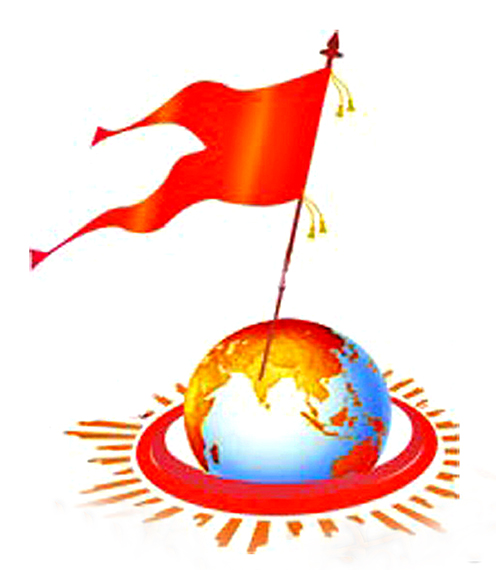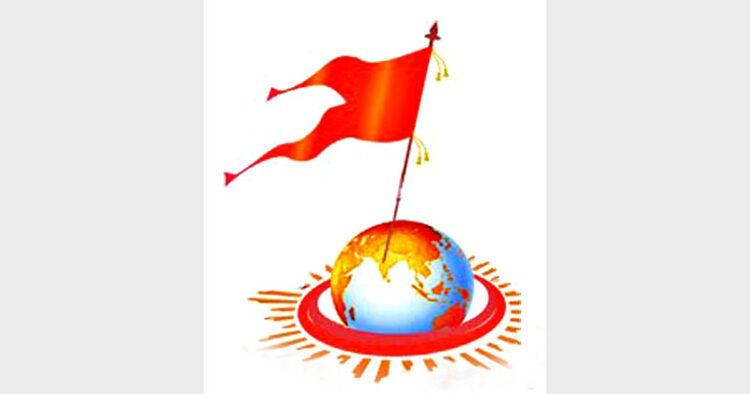
In the wake of current events in the country, a lot of people are often caught debating nation, nationality, democracy and religion. But my take away from getting to know the RSS a little and seeing their work that goes into nation-building has made me re-think these concepts
DEEPTI J VERMA
I am an Indian, which to me until a few days ago meant that I belong to India. I thought this was more of a physical, geographical and maybe even a cultural reality. I’m also a Hindu. But my faith, which is deeply personal to me, has nothing to do with my national identity. Or so I thought. Again, until a few days ago, I never once thought to blend my faith and my national identity. They are not the same thing. I very strongly thought the two shouldn’t mix, until a few days ago.
For we as ‘urban, modern, progressive’ Indians are taught to not mix our religious and national identity. While being patriotic is great, we are taught not to wear being a Hindu on ourselves whether it’s at work or social gatherings, for it might offend other religions of India. Being Hindu and being Indian are two different things and should be kept separate. Mixing the two is looked at as being communal and marginalising anyone who follows a different faith. India belongs to every faith equally, we are taught. India is a land of diverse cultures, we are taught.
A few days ago, I had a conversation about this with Dr Manmohan Vaidya of the RSS.
RSS, an organisation that believes India should be a Hindu Rashtra; that strongly believes in propagating the ‘Hindutva’ agenda. An organisation that sees everyone in India through saffron-coloured glasses. Or so I thought, until this conversation, a few days ago.
It was only during this conversation that I realised, how far from the truth was my ‘knowledge’ of the subject. For the first time, I heard and absorbed what it means to be ‘Hindu’ and how it isn’t at all far from being ‘Indian’ or ‘Bharatiya’. How they are the same thing.
Hindutva (Hinduism is a loose translation of the word, not quite accurate), is a way of life. It was life in this region of the world, much before religion existed. It was a way of life that continued to thrive, much after religion divided this country into two. And it will be a way of life here, despite the far-spreading business of religion today.
Bharat or India is the seat of this way of life. The soul of this nation is this throbbing, thriving, celebration of diversity. Being Hindu is celebrating this diversity and recognising the underlying sameness in the glaring differences. When I realised how biased I was in my idea of what ‘Hindutva’ or the Sangh’s work is, I decided to delve a little into the organisation and the work it is doing.
I’m a Hindu, which makes me an Indian. I’m an Indian, which makes me a Hindu. And where I fold my hands or bow my head in worship have nothing to do with it
The Sangh, which almost has a 100-year old history, is often looked at with suspicion by ‘liberal’ Indians. It’s often seen as a cult, where young minds are brainwashed and extremism fanned. In this article, I would like to address the five commonly held presumptions that I too held as a rational thinking writer, former journalist, and current digital content creator for millennials.
THE ORGANISATION IS NOT A POLITICAL, BUT A SOCIAL ENTITY
In the words of Dr Vaidya, a country if held strongly by just one pole (concentration of power), can fall apart if that pole is shaken. But if it stands on solid ground and many such poles, it can’t be infiltrated or harmed that easily. Our country has been such a country in the past, where many aggressors have come and gone but the basic fabric remained intact because of its strong character. The Sangh truly believes in empowering the citizen to become a part of this fabric. The citizen should be such that governments can be checked by the society at large. The Sangh aims to keep its work out of the political arena (even though one often hears of them pulling the main political strings), by empowering everyone who has gone through its ranks. Some have entered active politics, some choose to remain in the social space, some are working in the cultural and scientific fields, whereas others are working in their personal space following its tenets and playing their part in society. The Sangh, in that way, is more than just an organisation, which says a lot about an organisation that is the largest of its kind in
the world. More than an organisation within a society, the Sangh claims to be an organised state of the same society.
‘HINDU RASHTRA’ IS NOT A RELIGIOUS, BUT A CULTURAL CONCEPT
There is the word ‘Rashtriya’ with the name of RSS. What is then their concept of this word? According to Dr Vaidya, a nation is neither defined by its LoC nor by the state. It’s defined by its people and their emotion towards it. They have a strict guideline to that emotion though! One should have a feeling of reverence and sanctity towards the motherland. The people should have a common feeling towards their shared history–its joys, sorrows, heroes and villains. And the people should share a similar culture –the basic definition of what’s right and wrong.
So according to them, a Hindu Rashtra is not a place where only those following the Hindu religion exist. It’s a place where people share these common emotions and notions of a nation. It’s a cultural concept that underlines the feeling of co-existence and shared experience.
ITS NATIONALISM IS MORE PRACTICAL & FUTURISTIC THAN JINGOISTIC
One should differentiate between anti-government and anti-India, says Dr Manmohan Vaidya. While new Bills like the Unlawful Activities (Prevention) Amendment (UAPA) might seem like they are clamping down on democracy, in the long run, they are aiming at a stronger law against sedition, guarding our nation against the enemy within. As a country, this kind of nationalism can only strengthen its wellbeing. While dialogue is good, national security is non-negotiable. Certain checks and balances against systematic brewing and/or condoning of an anti-national sentiment are strongly discouraged in all strong nations of the world, and it should not be any different here in a bid to uphold ‘free speech’.
ITS IDEA OF AN IDEAL SOCIETY IS NOT TRENDY, YET PROGRESSIVE
Imagine a world, where everyone plays their part in a bigger picture. Imagine a world, where the good of the nation is above that of a family, and the good of a family above that of an individual. Imagine raising your children in a country that has peace within, yet a powerful personality in the world. Might seem too idealistic, but that’s the kind of society the Sangh wants to build and has been trying to build through its centres. Their idea of society might not seem trendy, as it might seem like they are against any kind of modernisation, but that’s not entirely true. They are against the glorification of what’s usually considered ‘modern’. As long as modernity has its place and tradition has its place and there is a balance between the two, society can progress far more, according to them.
ITS IDEA OF EDUCATION IS NOT MATERIALISTIC, BUT HOLISTIC
I once had a chat with an American cousin of mine, who is studying to be a doctor, about how only when she attended an exchange programme in Spain, did she understand what was wrong with the American system of education. A system that had made her ambitious, curious, argumentative, was also systematically burning her out. It was goal-driven, not value-driven. It was quantifying her life, leaving very little room for quality things. This is exactly what’s also happening to the private education system in India, I thought. While we are teaching our children how to chase numbers – that too fast, sometimes using shortcuts—we are not teaching them things that add real value to life in the long term. While achieving goals is a great thing, what is greater is understanding the wherewithal to deal with challenges as well as disappointments. The world over, people – including leaders, CEOs, achievers—are understanding the value of things like yoga, meditation and an ancient way of thinking that puts a premium on a quality of life that comes from the inside out. This kind of education, which strengthens your basic backbone, is the kind of education that the Sangh has been propagating for decades through its schools, run by volunteers, without any financial aid from the government.
Bharatiya Shikshan Mandal’s organising secretary, Shri Mukul Kanitkar, was recently quoted as saying, “Just as ISRO is headed by scientists, education too needs to be free from the clutches of bureaucracy. Teachers should be encouraged to become administrators.” At the same time, the BSM has welcomed the suggestion in the draft education policy – drawn up by the K Kasturirangan Committee – to promote Indian languages. It is in pursuance to the mission of re-establishing the universal knowledge of Bharatiya education system in the contemporary world. BSM president Dr Sachchidanand Joshi recently said the BSM believed in the power of intellectual discourse, which was imperative to ‘Bharatiya culture’. Referring to intellectual discourse, he added that
the Vedas mention “Vaag, Vaad and Samvaad”, for which sadly we don’t have equivalent words in the
English language.
In the wake of current events in the country, a lot of people are often caught debating nation, nationality, democracy and religion. But my take away from getting to know the RSS a little and seeing their work that goes into nation-building has made me re-think these concepts.
Bharat goes beyond the lines drawn on a map. Bharat is a concept of inclusivity and humanism that has transcended generations and generations, invasions after invasions.
In the words of Ernest Renan: A nation is a spiritual principle… and not a group determined by the configuration of earth… a nation is a soul… the nation, like the individual, is the fruit of a long past spent in toil, sacrifice and devotion. It couldn’t be truer for a nation like ours. Similarly, Being Hindu goes beyond the God you worship. It’s the celebration of the various paths that lead to the same God. In its Hindutva lies this
nation’s essence.
I’m a Hindu, which makes me an Indian. I’m an Indian, which makes me a Hindu. And where I fold my hands or bow my head in worship have nothing to do with it.









![A Representative image [ANI Photo]](https://organiser.org/wp-content/uploads/2025/12/representative-image-e1765612818961-120x70.webp)



Comments